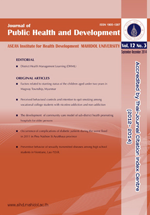A causal relationship model of factors influencing glycemic control among the elderly with type 2 Diabetes Mellitus in Sukhothai Province, Thailand
Main Article Content
Abstract
The purpose of this study was to investigate the causal relationships model of the factors influencing glycemic control among the elderly with type 2 diabetes mellitus (T2DM). A multi stage sampling was used to recruit 390 patients with type 2 diabetes from 9 primary care units in Sukhothai Province. Data were collected by questionnaire with reliability value of knowledge, social support and self-care behaviors were 0.81, 0.82 and 0.82, respectively. Data were analyzed using descriptive statistics and testing a causal relationship model by path analysis.
The results showed that 58.5% were females. Of 57.7% had duration of illness 1- 5 years with the mean of 5.48 years and S.D. of 2.42. Most of them (59.5%) aged 60-64 years with the mean age of 63.98 years and S.D. of = 2.29. Half of the sample had poorly controlled fasting blood glucose (FBG ≥ 126 mg/dl) with the mean of 135.19 mg/dl. The analysis of a causal relationship model illustrated by social support demonstrated direct effect on self- care behaviors (β = 0.81, p-value < 0.05), and explained the variance in self – care behaviors at 91%. On the other hand, diabetes knowledge had no direct effect on self-care behaviors (β = 0.15, p-value < 0.05). However, self-care behaviors had a negative direct effect on FBG (β = 0.82, p-value < 0.05), and explained the variance in FBG at 67%.
In conclusion, social support was the most important factor on diabetes self-management. Meanwhile, the knowledge cannot change their behavior. In order to control T2DM among the elderly, the focus should be on promoting social support rather than diabetes knowledge.


